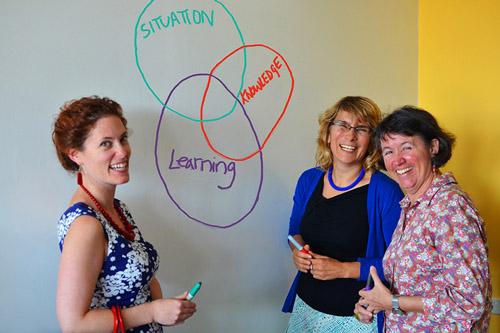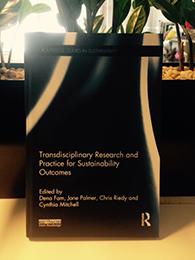
" alt="Author Dr Dana Cordell with editors Dr Dena Fam and Prof. Cynthia Mitchell" title="">
A new book that examines the role of transdisciplinarity and its potential to address some of the apparently intractable problems facing society is now available from Routledge.
“There is help here for diverse readers seeking a better understanding of what is happening to their society and their planet – the anxious individuals, disturbed communities, confused experts, frustrated organisations and hopeful agents of change.” writes Prof. Valerie Brown in her preface to the book edited by ISF’s Dr Dena Fam, Prof. Chris Riedy and Prof. Cynthia Mitchell with Dr Jane Palmer from the University of Southern Queensland.
Whilst the term remains controversial, and competing schools of thought remain, transdisciplinary (TD) inquiry has moved beyond the fringe of academia and into fields such as change management, research practice, and forecasting future directions.
Prof. Brown, a highly respected authority on transdisciplinarity, praises the breadth of practice and the depths of theory documented in the book: Transdisciplinary Research and Practice for Sustainability Outcomes
The book grew out of the experiences of ISF researchers who have been conducting transdisciplinary research over the last twenty years to create change and shift thinking towards sustainable futures.
Some of these research projects are profiled in the book as case studies demonstrating the challenges and rewards of TD work.
The editorial team are delighted to augment ISF’s contributions with other chapters representing a who’s who of transdisciplinary expertise and experience globally.
From early on, ISF researchers found compartmentalised disciplines were deeply unsatisfactory when it comes to developing new knowledge and finding solutions to complex, ‘wicked’ sustainability challenges such as water and food security, poverty and climate change impacts.
Transdisciplinarity brings together different sets of rules, values and meanings from different disciplines and integrates different ways of understanding that can be applied to research that engages clients, collaborators and the community.
Whilst the case studies in the book draw on knowledge and tools from the biological sciences, ethnography, agriculture and ecology; they also show how a need for a common language that links disparate participants of a TD project can be addressed through storytelling and sensitive community development strategies. The case studies show how systems-based ideas can be shared through diagrams, song, drawings and dance.
The book draws on what has been learnt during the twenty years ISF has been supervising TD postgraduate research students, to examine how to best develop and support researchers in transdisciplinary practice.
At UTS, transdisciplinarity has come of age. An Australian first, The Faculty of Transdisciplinary Innovation (FTDi) offers degrees that encompass high-level critical and creative thinking, problem solving, data and digital technologies, invention, complexity, innovation, future scenario building and entrepreneurship.
Ideally, TD research and practice incorporate:
· a unifying structure that allows for both the independence of the parts and their recognition as wholes;
· deep humility and respect for ‘the other’ on the part of all involved;
· a value orientation for transdisciplinarity which requires changes that go beyond current practices; and
· a set of rules which permit, and even encourage, uncertainty and creativity in a self-organising system of knowledge.
Imaginative ideas which could carry transdisciplinary practice into the future include: cross-cultural collaborative learning; all participants ‘being present’ in the project; and researchers’ reflections on the issues allowing them to recognise their own version of reality, and their own values, ethics, aesthetic responses and sympathies.
Prof. Brown concludes: “In this book you can find a wide range of structures, values and rules which can put into effect both an academic and a community-wide transdisciplinarity”.

Transdisciplinary Research and Practice for Sustainability Outcomes Eds: Fam, D.M., Palmer, J., Riedy, C. & Mitchell, C.A. 2016, Routledge, UK.

